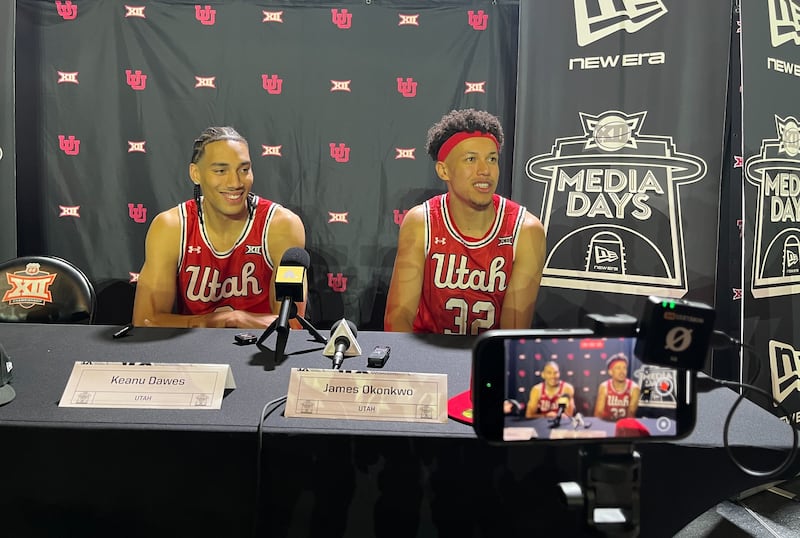KANSAS CITY — Utah was one of the newbies in Big 12 basketball last year.
Now, the program’s first-year head coach, Alex Jensen, is one of the guys getting his first taste of Big 12 basketball, a process that continued with media days this week.
The veteran coach who’s making his foray into being a head coach at the collegiate level — at his alma mater, no less — fit right in with his peers.
“Don’t look back, don’t look forward. Whether it’s good or bad, just keep going. And I think if you do that, you’ll find yourself in a place that you are happy to be.”
— first-year Utes coach Alex Jensen
Jensen has an extensive pro background — he spent the past 12 years as an NBA assistant — and previously was a head coach in the D League (now G League), as well as a college assistant.
He’s getting his education in real time on the college game, and on the Big 12 — an ongoing lesson that will amp up when conference play begins as the calendar turns over to 2026.
“Each day I learn how good the league is, the more I watch. I’m sure it will be a baptism by fire. But the physicality, there’s established programs, great coaches and we definitely have our work cut out for us,” Jensen said Wednesday during a roundtable discussion at media days.
“It’s the truth, I’m going to learn a lot. I’m looking forward to that. Hopefully there’s some success tied into that as well.”
In time, the expectation is that Utah will be able to compete in the Big 12 with a proper foundation and break back into the NCAA Tournament field.
What’s the benchmark for Utah in its second Big 12 season, though, under a first-year head coach?
The Utes were projected to finish 13th in the league in the Big 12 coaches preseason poll.
That’s three spots up from last season, when the Runnin’ Utes were picked to finish last in their first year in the conference.
Jensen stressed the importance of not worrying about outside noise.
“One of the things I was blessed with early by my college coach was, if it had nothing to do with winning the next game, then you didn’t talk about it or think about it,” Jensen said. “No matter where we’re picked in the poll, it’s kind of the message I try to tell my guys — next play, next game.
“Don’t look back, don’t look forward. Whether it’s good or bad, just keep going. And I think if you do that, you’ll find yourself in a place that you are happy to be.”
The Utes went 8-12 in Big 12 play last season. That included home wins over BYU and Kansas.
Utah, though, finished the year by losing six of its last seven games.
Utah has 12 new players on its 15-man roster, as the Utes saw an exodus of players after there was a change in leadership from Craig Smith to Jensen.
One of those returnees, Keanu Dawes, echoes his coach when it comes to outside expectations surrounding the program.
“Just go out and show people that that poll doesn’t matter,” Dawes said. “The only poll that matters is what comes out at the end of the year.”
Dawes is one of three returning players for Utah and the only one to play extensive minutes. He averaged 8.3 points and 6.4 rebounds per game last season and came on strong at the end of the year, bumping that average up to 13.2 points and 10 rebounds over the team’s final six games.
He’s joined by incoming transfer talent that includes guard Terrence Brown (Fairleigh Dickinson), forward James Okonkwo (from Akron), forward Seydou Traore (Iowa), forward Jahki Howard (Alabama), guard Elijah “Choppa” Moore (Syracuse), among others.
It’s a group that is saying the right things, staying focused on the process of building a winner and preaching a “team together” mantra.
“Just playing our game, just doing what we can do, playing team together, that’s what we say every day,” Dawes said. “And doing exactly that, being confident knowing that we can compete with any team, not only in the Big 12 but the country, just being able to show it every day.”
Okonkwo added it’s important to not get lost in the process.
“Because if you think about it from a standpoint we need to win X amount of games and X amount of days, you get in your own head,” he said. “It’s just about taking it each day as it comes.”
Beyond this year, this team understands it has the chance to build the foundation for future success with its actions and results now.
“Obviously, we personally want to win right now, and I think that, in turn, will build long term, because the faster you win, the faster you get more resources, the faster you get more players,” Dawes said. “And that yeah, it helps right now, but also helps long term. So I think it just ties in together.”
That includes putting in the work each and every day to move the program forward.
“We also want to set the foundation of just everything that he wants Years 2 and 3 to be so theoretically, if we don’t play hard at practice, that sets a precedent,” Okonkwo said. “If we do play hard at practice, that sets a precedent. We don’t want to push the needle back before we push it forward.”


